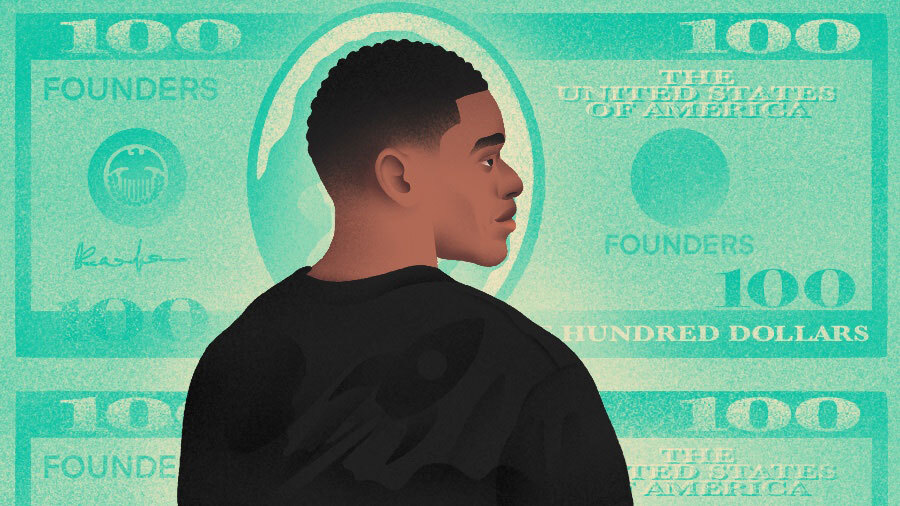Editor’s note: This is the first in a two-part series on the state of venture funding to Black-founded startups in the U.S., based on 2023 data from Crunchbase and its Diversity Spotlight feature. Look for Part 2, which will explore funding trends in several major metro areas in the U.S., on Thursday.
Venture funding to Black-founded U.S. startups last year totaled only $705 million — marking the first time since 2016 that the figure failed to even reach $1 billion, Crunchbase data shows.
The decline in capital to Black-founded companies greatly outpaces the overall decline in startup funding. While total venture dollars in the U.S. fell 37% last year, funding to Black-founded startups dropped a staggering 71%, according to Crunchbase data.
Last year’s total investment in Black-founded startups in the U.S. marks the lowest amount since such startups raised only $582 million in 2016. The drop in total dollars also meant Black-founded startups received their lowest share in the venture market since at least 2016, per Crunchbase.
Black-founded startups received less than 0.5% of the $140.4 billion in venture funding all U.S.-based startups received last year.
In 2021, Black-founded startups received 1.4% of all U.S. venture funding. In 2022, it was 1.1%.
“Unfortunately, nothing is really surprising,” said Paul Judge, who along with Marcelo Claure took over the Open Opportunity Fund from SoftBank last year. The fund is dedicated to supporting Black and Latinx founders.
“The fact it is not trending in the right direction is certainly a problem,” he said.
Same old
The numbers stand in stark contrast to what many VC firms and strategic investors promised nearly four years ago when they pledged more diversity in their venture spending after the death of George Floyd.
“At the time people said they would do something, but when there’s a downturn funding always goes back to what it always does,” said Judge, who is also a co-founder of incubation center TechSquare Labs.
When one considers 13% of the U.S. population is Black and more than $140 billion in venture capital was involved in the U.S. last year, it should be reasonable to expect Black funding numbers to be around $18 billion, Judge said.
“Funding was less than $1 billion a year,” he said. “That means we have about a $17 billion problem. People understand money, so they should understand that. Now we need a $17 billion solution.”
Judge added that one way to find that solution is to show the investors the return potential of startups with diverse leadership.
“People just haven’t realized the financial rewards” of investing in startups with diverse leadership, Judge said. “Minority-led companies consistently outperform.”
Judge noted that many minority-led companies excel at what investors are looking for now — cash efficiency and low burn rate. Minority-led companies often can stretch their dollars further and for longer, he said.
In the open fund portfolio, 57% of its companies are Black-founded, and on average they are experiencing 100% revenue growth year to year and have at least two years of runway.
Declining dollars
While the year-to-year numbers are striking, they are even more dramatic when one considers funding to Black founders totaled $4.9 billion in 2021 — a record year for venture capital spending. Last year’s number represents an astonishing 86% drop from 2021.
All stages were down when it came to funding to Black-founded startups, Crunchbase data shows.
Angel and seed rounds dropped 51% compared to 2022, with only $148 million raised.
Both early-stage and late-stage rounds saw a more pronounced drop. Late-stage rounds fell 73% with $259 million raised, while early-stage rounds plummeted 74% with a paltry $298 million raised.
The late-stage numbers meant a scant 0.3% of all late-stage funding in the U.S. went to Black-founded startups.
Mark Buffington, co-founder of BIP Capital in Atlanta — typically a leading region for funding to Black founders — said that it is hard to conclusively say why the numbers are down. Still, one hypothesis is that some startups funded in the wake of Floyd’s death and subsequent racial justice movement, prompting more VCs to look more into DEI initiatives, may be having a difficult time raising later rounds now, in a tougher market that has never favored Black founders.
“Some of the dynamics that existed downstream (before Floyd) that made it difficult to get funding are still there,” said Buffington, noting the networking needed to help consummate larger rounds.
The numbers seem to bear that out as 82% of all rounds raised by Black-founded startups in the U.S. last year were seed or angel rounds, while only 3% were late-stage fundraisings.
Big rounds dwindle
It is important to note large late-stage growth rounds usually make up the smallest percentage of rounds due to the normally high-dollar value. That also makes them the most difficult to raise.
However, last year saw just one $100 million-plus round by a Black-founded startup in the U.S., and only three rounds of more than $30 million.
For comparison’s sake, last week alone saw seven rounds of $100 million or more raised by U.S.-based startups.
In 2023, the largest rounds to Black-founded startups in the U.S. included:
- San Francisco-based investment management platform Juniper Square raising a $133 million venture round led by Owl Rock.
- Los Angeles-based media firm Macro locked up a $90 million round co-led by BlackRock and HarbourView Equity Partners.
- San Francisco-based Clerkie, developer of an AI financial planning tool for underserved Americans, raised a $33 million Series A led by Left Lane Capital.
Those raises would seem to illustrate the key reason funding to Black-founded startups saw such a dramatic decline — a dearth of large rounds. Without such rounds, funding numbers usually drop as it is difficult for seed and early-stage rounds to make a significant difference.
In 2021 and 2022 for example, there were a total of 17 rounds that went to Black-founded startups that were $100 million or more.
Deal volume plummets
While money talks — and gets people talking — deal volume also paints a poor picture when it comes to Black founders getting funded.
The 173 rounds funded last year — a 48% drop from 2022 — is the lowest deal volume in at least the past eight years. Likewise, both seed/angel and early-stage funding also hit their lowest totals in at least the past eight years.
The shrinking deal volume does not come as a surprise to investors. James Norman, co-founder of Black Operator Ventures, said he sees fewer deals getting done, with most people focusing on reinvesting in current founders who have solvent businesses.
In a down market, “it’s going to seem a lot more extreme on the Black founders, as it is on others, because there’s not as many deals to re-up into that are led by Black founders,” Norman said.
One of the important aspects about deal volume is that if early deal volume drops, that means there will be fewer companies eventually ready to raise larger late-stage growth rounds — which in turn will keep funding levels decreasing.
Of course, that would be consistent with what has gone on the past two years.
Another factor? Consumer startup funding slowdown
Slowing investment to a host of consumer-facing sectors, from e-commerce to the app economy, may be another factor behind the recent contraction in funding to Black-founded startups.
In the past three years, several of the most high-profile and heavily funded startups with Black founders are consumer-facing companies. But most last raised financing more than two years ago.
This includes:
- Scheduling app Calendly, founded by Atlanta entrepreneur Tope Awotona, has raised $350 million to date. But its most recent — and primary — funding round was just over three years ago.
- Lingerie brand Savage X Fenty, launched by pop mogul Rihanna, has raised $310 million to date, with consumer-focused investor L Catterton as a lead backer. However, the El Segundo, California-based company hasn’t raised a known round since its Series C two years ago.
- Cityblock Health, a value-based healthcare provider led by physician and co-founder Toyin Ajayi, is the biggest funding recipient, with $891 million in known equity investment. However, the Brooklyn-based company raised its most recent disclosed-size financing — a $400 million SoftBank-led Series D — in September 2021.
Several other well-funded consumer-facing startups with Black founders have also not secured a fresh round for more than two years. This includes New York-based barbershop app Squire, backyard cottage purveyor Gardena, California’s Cover, and Chipper Cash, a San Francisco-headquartered provider of payment cards and money transfer services in multiple African countries.
Notably, while overall U.S. startup investment fell sharply last year, not all sectors are following the same pattern. Some areas, such as AI, have heated up significantly. Others, like biotech and robotics, are down but still see significant deal flow.
Meanwhile, a lot of once-hot spaces, like consumer-facing apps and direct-to-consumer e-commerce, have seen much steeper declines. Black-founded companies active in these spaces have not been spared the impact of this broad downturn.
— Joanna Glasner contributed to this article.
Methodology
Funding amounts and counts for the most recent year were collected through Feb. 23, 2024.
The data contained in this report comes directly from Crunchbase, and is based on reported data provided by our Diversity Spotlight partners, venture partners, our community network and news sources. The data in this report is focused on the U.S. market for underrepresented minorities, namely Black-/African-American-founded companies.
Crunchbase’s dataset is constantly expanding, but there are gaps. A company may not have founders listed, or the Diversity Spotlight data may not be updated on its Crunchbase profile. We do believe we are missing companies, especially at the early stages of funding.
If you notice missing data please reach out to spotlight@crunchbase.com or verify with your company email to update your company’s Diversity Spotlight tags directly onsite.
Crunchbase, like all databases of private-market transactions, has a documented pattern of reporting delays. The data for 2023 will increase over time relative to previous years. As data is added to Crunchbase over time, some of the numbers in this report may shift.
Related reading:
- Special Series: VC Dollars To Black Startup Founders Fell More Than 50% In 2022
- Special Series: Black-Founded Startups Raised Large Rounds, Added 3 Unicorns in 2022
- Special Series: Black-Founded Startups Attract Funding By Filling Gaps In Health Care Equity
- Funding To Black Startup Founders Quadrupled In Past Year, But Remains Elusive
- Black Women Still Receive Just A Tiny Fraction Of VC Funding Despite 5-Year High
- Culture, Colleges And Corporations Help Push Georgia To The Top In VC Funding To Black Founders
- Something Ventured: How Black Founders Can Increase Their Chances Of Raising Capital
Illustration: Dom Guzman

Stay up to date with recent funding rounds, acquisitions, and more with the Crunchbase Daily.



![Illustration of a guy watering plants with a blocked hose - Global [Dom Guzman]](https://news.crunchbase.com/wp-content/uploads/quarterly-global-3-300x168.jpg)
67.1K Followers